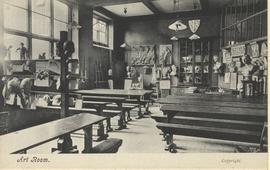- GB 2014 WS-02-ORA-035
- Item
- 2015-03-03
How did you come to attend Westminster School (WS). Went to Francis Holland School (FHS) Sloane Square – an artsy school so not sufficient to study Physics and Chemistry A-Level. At Sixth Form girls often went to FHS Regents Park or St Paul’s Girls School. Relationship with WS for drama. Came on her own in 1967. [1,29] Brother was in Wrens 2 years below. Still studied maths at FHS. [1,44] First impressions. Much larger. Boys seemed very young, with 13 and 14 year olds in the class as they were scholarship. [3,00] Reaction of boys to have you in lessons. Good relationships with ones in class. College Hall - others who didn’t know her would show off, naïve. [3,46] separate table for Jewish boys. Sat with them to have intelligent conversation at lunch. [4,15] Treatment from masters. Good chemistry master. Some peculiar characters. [5,03] top set Physics, flamboyant teacher D. Hepburne-Scott. Keen on trains. Liked him at the time. [5,27] Old reports. Reveal he was quite damning of female capability, made disparaging misogynistic comments about her intellect and female domesticity. [6,56] Housemaster Mr Ross was embarrassed by this. [7,48] some positive comments, eventually acknowledged her potential, but still made allowances due to her sex. [8,58] academic standard. Teaching style was completely different. [9,46] whole a-level syllabus in 1 year. Exploring things that were interesting outside of the syllabus. Nuffield Chemistry. [10,43] teaching was eye opening. Responded to it well. [11,00] preparation of WS for university. Went into medicine. Accepted institutional sexism – 70 places for boys and 7 for girls. Gained confidence at WS, and got a scholarship at medical school. [12,13] joined the army after qualification. 350 medical officers, 9 women. Learnt to be gender-blind. [13,05] other characteristics gained from WS. Enjoying learning for the sake of education. Appreciated the leeway. [14,45] didn’t spend much time in school outside of lessons, as was only half at the school. Used 4 Barton Street sitting room and bathroom. Would spend half a day at each school. [15,35] time in St James’s Park in summer. Went home to Holland Park. Didn’t socialise much with the boys. [16,44] no facilities for girls. She was attached to Wren’s. Used staff toilet. School was experimenting with having female pupils, after she left, a couple of FHS girls arrived. Didn’t work financially to be under this setup. [18,00] fees at FHS were £90 per term. £150 per term at WS. Parents had to pay both schools. [18,53] would recommend it to girls at the time. Teaching is invaluable. Put into practice. Comfort being in an unusual situation, pushed the boundaries. [19,48] friendships with the boys. Didn’t last. Never invited to be an Old Westminster – institutional sexism. Didn’t feel fully part of the school. [21,01] met some who did medicine. Nearly all 3 years younger – started later as even though they’d got their qualifications they were too young. [22,38] difference between hers and her brother’s experience. Brother expelled for trying to set the school on fire and went to Marlborough. Similar friends. Didn’t compare experiences much. [23,41] no uniform at FHS Sixth Form, and none at WS. [24,26] WS customs. The Greaze. Unique slang to other schools. [25,19] difference to FHS atmospherically. Change in Sixth Form environment in itself at both schools. Only girl doing A-Level Maths at FHS. Good teaching, different as learning with people who were doing subjects they had chosen and had a passion for, as opposed to that they were forced to do. [26,42] assumption at WS that you were quick learners and would understand. Take things to a greater depth than required. Assuming interest. [27,46] Boys more politically engaged. Intellectual conversations at meals, but this was at FHS. [28,50] Didn’t show off their wealth, but also a lot of wealth at FHS. A level of class was assumed. Image proposed by the school changed in recent years. [30,49] pleased that WS accepted girls. Good for both sexes. For girls, especially in the 60s, beneficial to compete healthily in academics. [32,06] school reports. [33,36] impromptu trip in Physics to see the Flying Scotsman make its last ever scheduled run from King’s Cross. Went by tube, packed platform. More liberal teaching.

